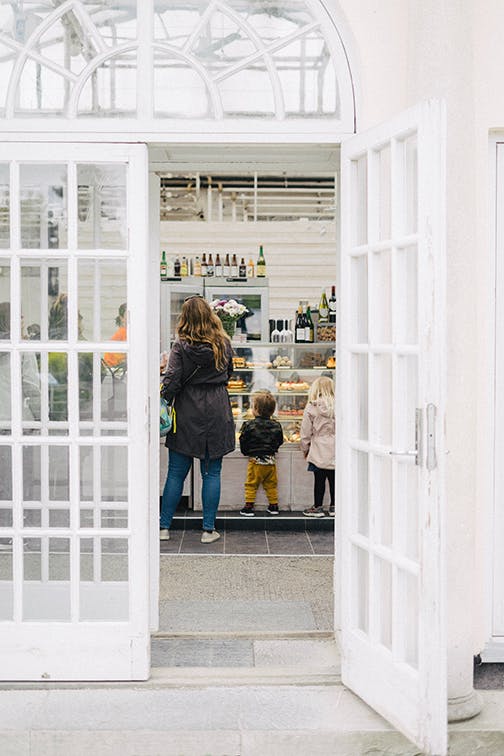
French doors are the weakest point in home security. They are often used as patio doors and are an aesthetic choice for a home. The two doors swing together, either outward or inward, and fasten when they meet in the middle. Some french doors use passive and active doors, meaning that one door remains in place while the second door swings out. Less often, both doors can be opened and closed, and both doors will be considered active doors.
French doors are harder to secure than regular doors. When they aren’t locked properly, or they are not installed with additional security measures, french doors can be easily opened with one kick from the home intruder.
This doesn’t mean that you should entirely replace your french doors. Instead, securing them with french door security tools can ensure that even the weakest french door is secure and protected against burglars.
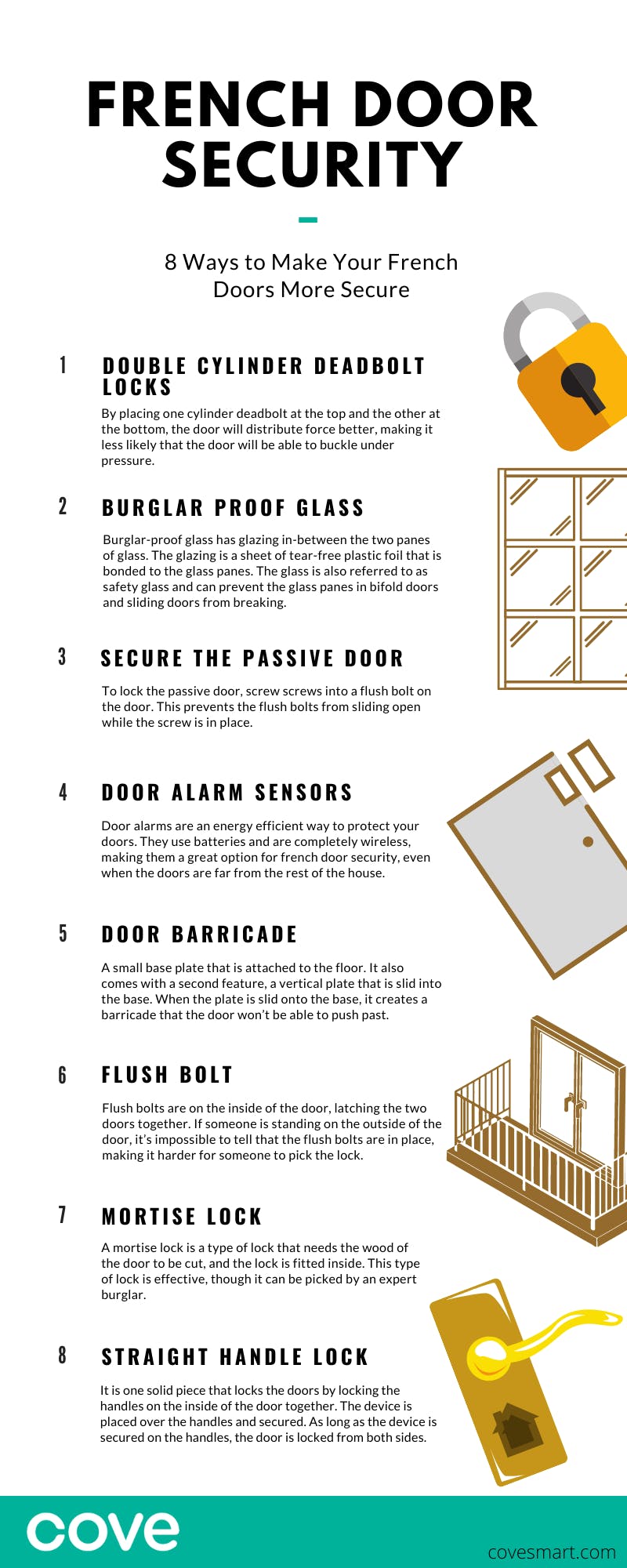
Are French Doors Safe?
No, french doors are not safe. They are actually the weakest type of door or window that you can have in your home. However, they are also a beautiful and elegant way to accent a patio or backyard. The fact that they are a weak point in your home security only means that you should take additional steps to protect them, not that you should remove them and replace them with a solid steel burglar-proof door.
French doors are weaker than a typical door because they meet in the middle. On a regular door, the door meets the door frame, which is connected to the wall. When the deadbolt is locked, the door is, essentially, secured to the wall. When a burglar attempts to break in the door, they will have to apply enough force to either break the door itself (since the wall is unlikely to break) or break the deadbolt.
To break in a door with a deadbolt, a burglar will need to kick the door with 70 pounds of force at least 40 times. If the lock is a standard lock (with no additional security measures), an experienced burglar may be able to break in the door on the first or second kick. However, doing this to a regular door will be loud and will shatter the door from the lock (not exactly the low-key type of thing for a burglar).
To break in a regular door that has not been installed with additional security features, a person must do the following:
- Make sure that the door swings away from you. It will be nearly impossible to kick down a door that swings towards you.
- Kick either just above or just to the side of where the handle is located (on the opposite side of the hinges). This is the weakest part of the door. Do not kick the lock directly.
- Kick forward, driving the heel of your foot into the door. Use your momentum to carry your body weight into the door.
- Ensure that your back foot stays firmly planted on the ground by driving your back heel into the ground.
- The wood should start to splinter after the first kick or two, depending on the amount of force that you are able to apply. Most people can’t kick open a door on their first try.
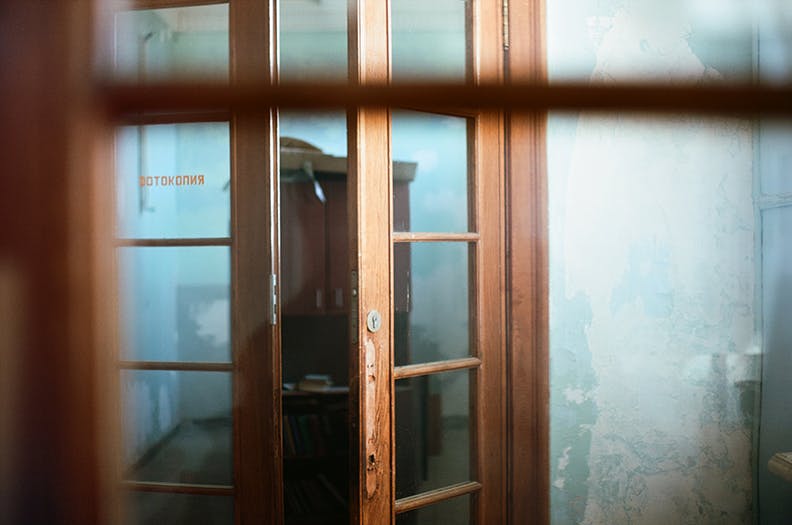
On the other hand, a regular set of french doors can be broken with a minimal amount of force on the first try, without completely breaking the door or making a lot of noise. One of the reasons why french doors are so vulnerable is because of how easy it is to break thorough them. To break open a set of french doors, a person must do the following:
- Kick forward, hitting either above the lock on either door. Use your momentum to push your body weight into the door.
- If done adequately, the active door should buckle inward, slipping the lock from its place and opening the door.
- If you don’t feel like kicking the door, you could also just shove the doors, and one of the doors should come unlocked.
French doors are an insecure door for protecting your home. Securing them is the most important thing that you can do for your home security. When french doors lead to a patio or yard, burglars have immediate access to your home. Improving your french door security can prevent break-ins and make your home more secure. So, how can you secure exterior french doors?
How to Secure French Doors
There are many ways to secure french doors. From french door locks to a french door security bar, homeowners have a wide variety of options that will secure and protect their doors.
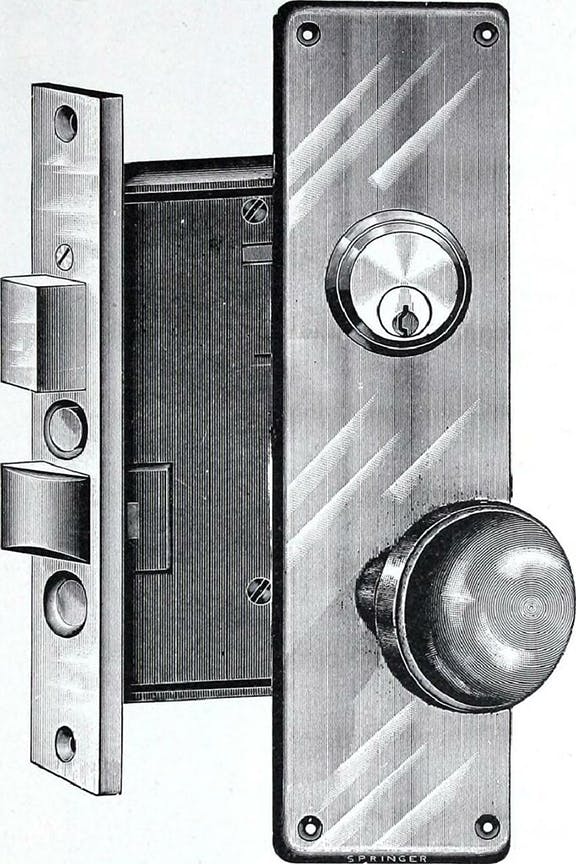
Double Cylinder Deadbolt Locks
The first option that homeowners with french doors have is to install double cylinder deadbolt locks. French doors have no center frame, making it easy for the manufactured lock to slip out of place when force is applied to the door. The cylinder deadbolt should be installed to both the top and bottom of the door to make sure that the locks on the door are placed evenly. By placing one cylinder deadbolt at the top and the other at the bottom, the door will distribute force better, making it less likely that the door will be able to buckle under pressure.
To install a double cylinder deadbolt lock, the door frame will need to be prepped. If your DIY skills are up to par, you may be able to do this yourself. However, getting a professional might be easier and will guarantee that the job is done right. One of the best locks for the job is called the Mul-t-lock. What makes the Mul-t-lock perfect for double doors is that the bolt has a small ball bearing that locks the bolt into space. This prevents the bolt from slipping out of place (which is typically how burglars are able to force double doors open). Using the double cylinder as your french door lock can help secure your doors and prevent home intrusions.
Burglar Proof Glass
Another option for homeowners with french patio doors is to install burglar-proof glass. When an intruder is unable or unwilling to break the deadbolt lock, some will attempt to break the glass windows on the door and open the door handles by reaching through the broken window. Since this is a possibility, it’s important that you replace the glass in the window panels of the french door with burglar-proof glass. This type of glass is meant to withstand force, making it the best option for security.
Burglar-proof glass has glazing in-between the two panes of glass. The glazing is a sheet of tear-free plastic foil that is bonded to the glass panes. The glass is also referred to as safety glass and can prevent the glass panes in bifold doors and sliding doors from breaking.
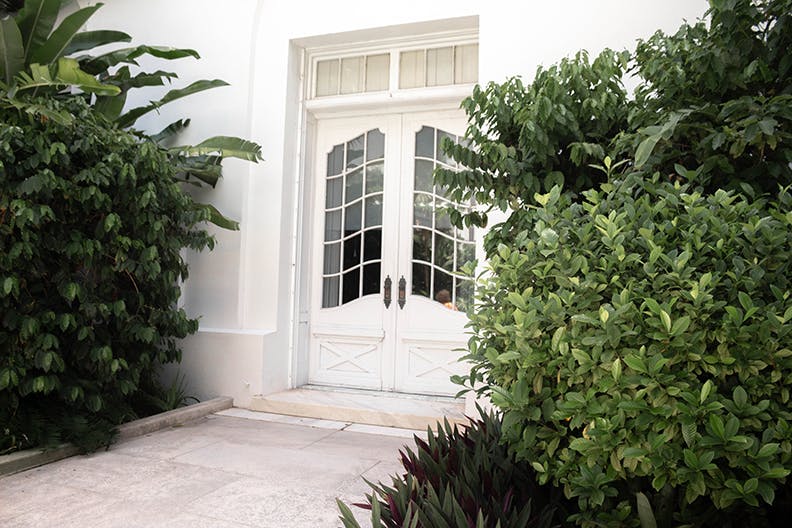
Secure the Passive Door
One of the main reasons why french doors buckle under pressure and force is because the passive door isn’t secured. Instead of being secured, the door is simply locked in place. However, it still has the flexibility to push a few inches in if someone applies force against the door. To prevent the door from buckling under pressure, it’s important to secure the passive door.
To lock the passive door, screw screws into a flush bolt on the door. This prevents the flush bolts from sliding open while the screw is in place. This also means that you will be unable to use the passive door until you take out the screws.
Door Alarm Sensors
To add additional security to your french doors with (and every other door in your home), use door alarms. Door alarms are a small security device that can be installed on every door from a sliding door to a hinged door. Door alarms are fairly inexpensive, especially if you secure your home with a DIY security system.
For double doors, one half of the door alarm should be attached to the passive door, and the other half of the alarm should be attached to the active door. When the doors are closed, the two parts of the sensors will create an electrical current. When a door opens while the alarm is armed, the alarm will go off. In most situations, when an alarm is set off, the intruder will run.
Door alarms are an energy efficient way to protect your doors. They use batteries and are completely wireless, making them a great option for french door security, even when the doors are far from the rest of the house. Door alarms scare away probable intruders and help you to know when your home is at risk.
Other French Door Security Products
When securing your front door or a porch door, it’s important to combine security devices to make your doors as secure as possible. Using only one security method to secure your door may still leave other weak spots exploitable.
Other french door security products include:
Door Barricade
A door barricade is a tool that can be used to stop a door from opening. It is a small base plate that is attached to the floor. It also comes with a second feature, a vertical plate that is slid into the base. When the plate is slid onto the base, it creates a barricade that the door won’t be able to push past. Essentially, the door barricade device is like moving furniture in front of the door to stop someone from opening the door on the outside. One of the best products for the door barricade is the Nightlock Security Lock. This product is made from brass and can be removed and attached whenever the homeowner wants.
Flush Bolt
A flush bolt is a type of door lock that can be installed on the top and bottom of the door. If someone is standing on the outside of the door, it’s impossible to tell that the flush bolts are in place, making it harder for someone to pick the lock. Flush bolts are on the inside of the door, latching the two doors together.
Mortise Lock
A mortise lock is a type of lock that needs the wood of the door to be cut, and the lock is fitted inside. This type of lock is effective, though it can be picked by an expert burglar. When using a mortise lock as your security lock, first make sure that you’ve backed up the lock with additional security measures such as the door alarm.
Straight Handle Lock
The straight handle lock is an unobtrusive lock that is secured to the door handles. The straight handle lock was made for french doors. It is one solid piece that locks the doors by locking the handles on the inside of the door together. The device is placed over the handles and secured. As long as the device is secured on the handles, the door is locked from both sides. The straight handle lock also prevents the doors from buckling in.
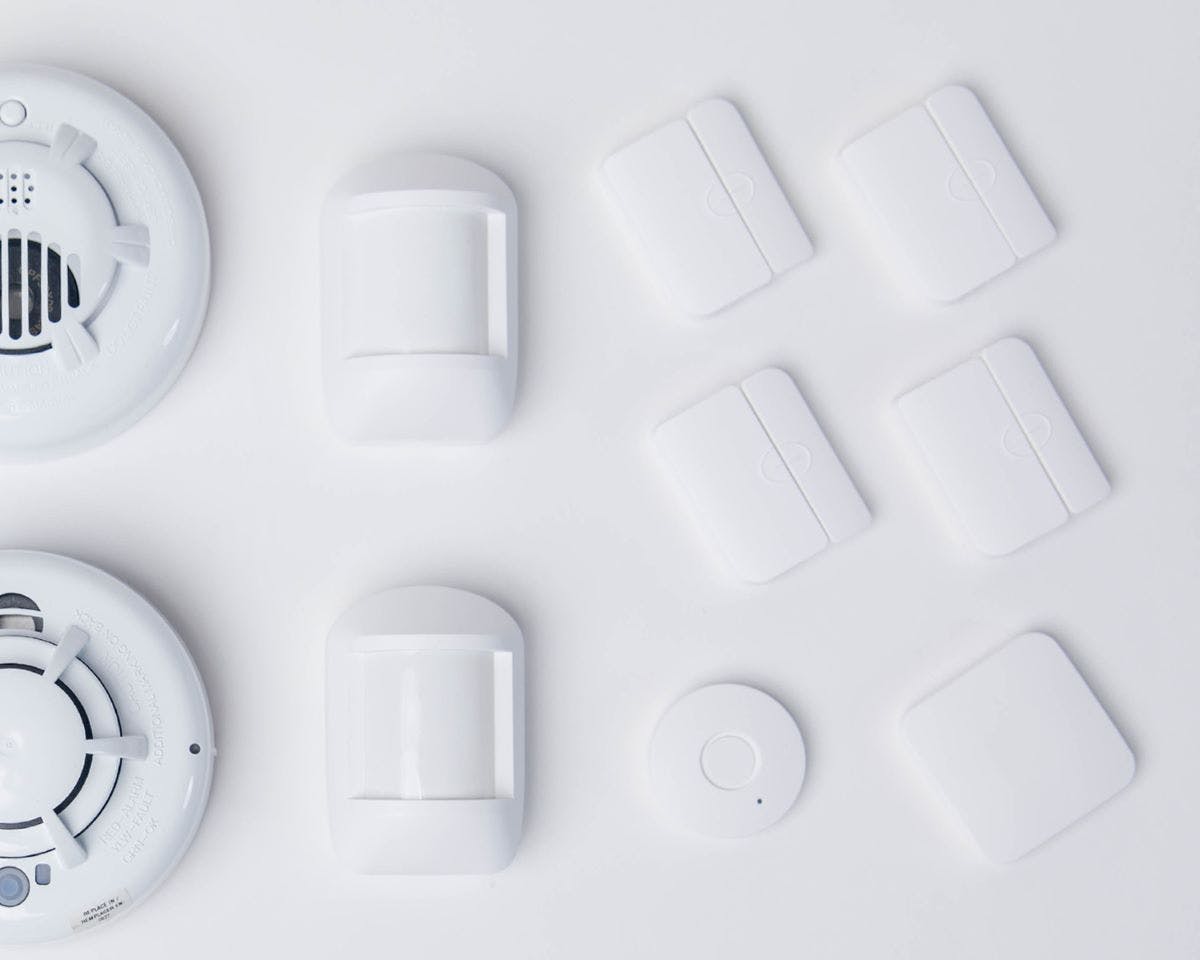
Complete Home Security
When securing your french doors with locking mechanisms, it’s important to remember that your home security is only as strong as your weakest link. So, if you have chosen to only secure your french doors, your home is still vulnerable. The rest of the doors and windows in the home are still weak without the protection of other security devices.
The best way to protect your home is by having a full home security system. A full home security system includes door sensors, window alarms, motion sensors, and security cameras. With a full home security system, intruders are barred from entering your home.
One of the best home security systems for homeowners looking for easy security is Cove Security. Cove Security is known for being one of the highest quality systems for the least expensive price. For only 15 dollars a month, Cove’s customers have access to all of the following:
- Door Alarms. Door alarms can be customized for your home, meaning that you will have enough door alarms for the french doors, the hinged patio doors, the entry door, and all external doors. Having a door alarm on every door will ensure that every entrance is protected.
- Window Sensors. Burglars who find that they can’t enter a house through the door will try the windows next. Because windows are often broken during a break-in, Cove offers both window alarms and glass break sensors to prevent windows from being an entry point for burglars.
- Indoor Security Cameras. Indoor cameras are installed with night vision, two-way voice, and remote access. These features ensure that the home will be protected both night and day.
- Professional Monitoring. Cove Security offers homeowners professional monitoring, included with their home security system. So, even when you’re not there to check up on your system, Cove is.
Cove Security is the best system for homeowners. It offers easy installation, no fees, and simple home security. Whether you’re trying to better secure your French doors or you’re hoping to defend your front door, Cove Security is the perfect system to protect your home.
